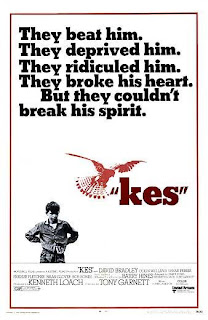Kes
Ken Loach is one of the key figures in British cinema. While not all of his films can be described as "miserabilist," they certainly aren't known for their cheeriness. Most of his films are grimly realistic and set among characters whose life is a daily struggle.
Kes, from 1969, is an early film of his, and was ranked 7th on the list of greatest British films. It is a deceptively simple, yet powerfully moving, story of a young boy who doesn't have anything going for him except his devotion to a kestrel, a small hawk, which he cares for and trains.
David Bradley plays Billy Casper, and a more put upon character in film would be hard to find. He lives in a coal mining town, and wants to quit school, but refuses to "work in the pit," like his older brother, who is about as nasty as can be. Billy has a history of stealing, so everyone mistrusts him, including his boss of a paper route, who chides him for being almost late. He is routinely picked on at school, but gets along better with the students that with the teachers, who are horrifying.
One day he comes across a nest of kestrels in an old monastery. He steals a book on falconry, climbs up into the nest to grab a female, names her Kes, and following the book's instructions, trains her. While this may sound like an avian version of Free Willy, it's not sentimental in the least. Billy insists that she is not a pet, and he could never tame her, he just trains her.
The scenes at school are the most memorable. The principal is a screaming monster who canes everyone, even a poor boy who has only come to his office to deliver a message. There is a long and simultaneously hilarious and harrowing scene of a soccer match during physical education class. Gym teachers are noted for being blights in education, but this guy is the worst, playing alongside the kids, and calling fouls on them while not calling them against himself. He puts Billy in goal, with predictably bad results. Then he punishes Billy for not taking a shower by spraying him with cold water.
Only one teacher takes an interest in Billy and his hawk, and comes by to watch him, later sitting with him in the shed where Kes lives. Billy says he feels that Kes is granting him permission to watch her. The connection between boy and bird leaps right off the screen.
The film was based on a novel called A Kestrel for a Knave, and was shot by Chris Menges, who would go on to be a major cinematographer and director. It helps to watch with subtitles, for the accents are nearly impenetrable to American ears.
Kes, from 1969, is an early film of his, and was ranked 7th on the list of greatest British films. It is a deceptively simple, yet powerfully moving, story of a young boy who doesn't have anything going for him except his devotion to a kestrel, a small hawk, which he cares for and trains.
David Bradley plays Billy Casper, and a more put upon character in film would be hard to find. He lives in a coal mining town, and wants to quit school, but refuses to "work in the pit," like his older brother, who is about as nasty as can be. Billy has a history of stealing, so everyone mistrusts him, including his boss of a paper route, who chides him for being almost late. He is routinely picked on at school, but gets along better with the students that with the teachers, who are horrifying.
One day he comes across a nest of kestrels in an old monastery. He steals a book on falconry, climbs up into the nest to grab a female, names her Kes, and following the book's instructions, trains her. While this may sound like an avian version of Free Willy, it's not sentimental in the least. Billy insists that she is not a pet, and he could never tame her, he just trains her.
The scenes at school are the most memorable. The principal is a screaming monster who canes everyone, even a poor boy who has only come to his office to deliver a message. There is a long and simultaneously hilarious and harrowing scene of a soccer match during physical education class. Gym teachers are noted for being blights in education, but this guy is the worst, playing alongside the kids, and calling fouls on them while not calling them against himself. He puts Billy in goal, with predictably bad results. Then he punishes Billy for not taking a shower by spraying him with cold water.
Only one teacher takes an interest in Billy and his hawk, and comes by to watch him, later sitting with him in the shed where Kes lives. Billy says he feels that Kes is granting him permission to watch her. The connection between boy and bird leaps right off the screen.
The film was based on a novel called A Kestrel for a Knave, and was shot by Chris Menges, who would go on to be a major cinematographer and director. It helps to watch with subtitles, for the accents are nearly impenetrable to American ears.



Comments
Post a Comment